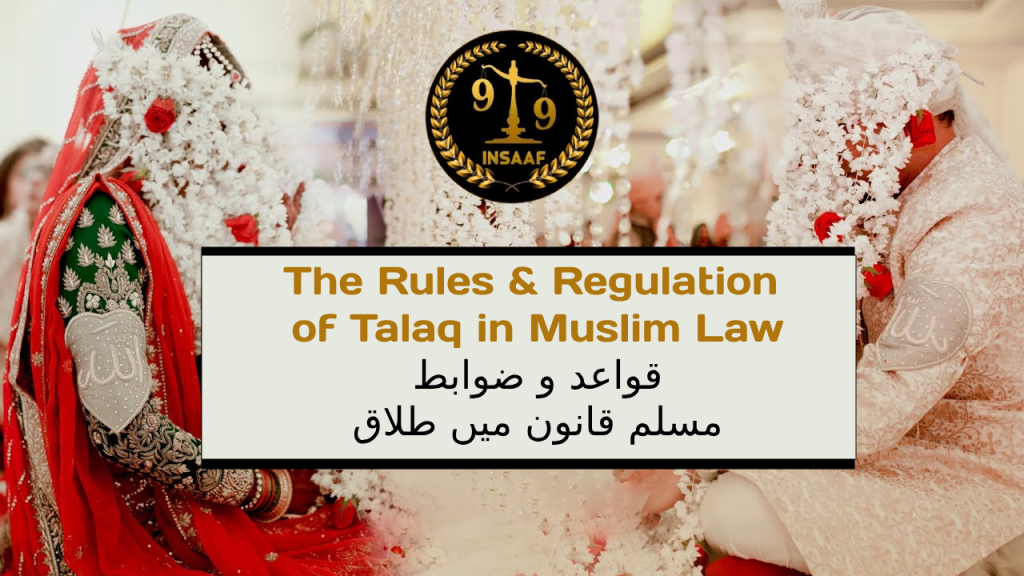

Online Legal Advice from Insaaf99® Online Lawyer Consultation in India


Online Legal Advice from Insaaf99® Online Lawyer Consultation in India

Talaq in Muslim Law, also known as divorce under Muslim Law or divorce in Muslim Law, is an important activity that is guided by religious standards from the Quran and Hadith. The concept of talaq, which has its origins in historical practices and religious tenets, has generated a significant amount of attention and controversy all over the world. It is vital to have a solid comprehension of the norms and regulations surrounding talaq to have a complete understanding of the complexities of Muslim family law and its influence on both people and society.
The practice of divorce in Islam is governed by a set of particular criteria that are spelt down in the Quran and Hadith (words and actions of Prophet Muhammad). Although it is customarily the husband who initiates the process of divorce in Muslim households, talaq is seen as a sacred right that can be awarded to both Muslim husbands and women. The act of talaq is firmly ingrained in Islamic custom, and its evolution throughout the course of Islamic history has resulted in a variety of different forms and procedures.
Let us delve into its types of talaq, methods, and legal ramifications. Gender roles, the rights of women, and the composition of families. In the framework of talaq, the problem of striking a balance between traditional values and contemporary realities is discussed to foster a broader knowledge of this essential component of Muslim family law.
Different forms of Talaq, or divorce, exist under Islamic law, each with its own procedures and consequences. Talaq-e-Ahsan, Talaq-e-Hasan, and Talaq-e-Bid'ah are the three most common varieties.
Talaq-e-Ahsan: This is the most preferred form of divorce in Islam. A solitary divorce decree is issued during the tuhr period, followed by an iddah waiting period for reconciliation. The marriage is dissolved if the spouse does not revoke the divorce during the iddah period.
Talaq-e-Hasan: In this form, divorce occurs over the course of three separate tuhr periods, with the possibility of reconciliation during the iddah period. After the third divorce decree, the divorce is irrevocable.
Talaq-e-Bid'ah: This is the least desirable form, in which three divorces are issued simultaneously without a waiting period. During iddah, reconciliation is impossible, and the marriage is immediately dissolved. By some scholars, Talaq-e-Bid'ah is discouraged and deemed invalid.
It is important to note that talaq practices may differ between Islamic institutions and cultures. Understanding these distinctions is essential for comprehending the complexities of divorce under Islamic law.
Talaq, the Islamic practice of divorce, follows a structured procedure and specific requirements to ensure a legally valid dissolution of a Muslim marriage. The following are the essential stages of the talaq procedure,
Please note that the actual procedure may vary depending on the specific interpretations and cultural practices of various Muslim communities.

In cases of talaq, arbitration and mediation are essential for reconciling the parties. Arbitration involves a neutral third party, usually a religious scholar or community elder, who guides discussions and helps the parties find common ground. Mediation uses a trained, impartial mediator to facilitate open communication and negotiation to reach mutually acceptable solutions.
Both approaches emphasize maintaining family and community ties, reflecting the importance of family support in Muslim communities. Arbitration and mediation allow spouses to actively participate in resolving their disputes, fostering a sense of ownership and responsibility. In cases where reconciliation is not possible, arbitration and mediation can still facilitate a more amicable divorce.
Talaq, the Islamic practice of divorce, has far-reaching consequences on financial and custody matters for the parties involved. Addressing the rights and responsibilities of both spouses is crucial in ensuring fairness and equity in the aftermath of a divorce.
In addressing rights and obligations in talaq cases, it is essential to adhere to Islamic principles while ensuring fairness and equity.
A compassionate approach to talaq can help in creating an inclusive and supportive environment for all the involved parties.
Insaaf99, an online legal consulting firm, specializes in providing expert guidance and assistance in matters pertaining to Talaq in Muslim law. Their knowledgeable legal professionals offer customized consultations, ensuring compliance with Islamic divorce requirements and advocating for women's rights throughout the process. They provide mediation services for amicable resolutions and adhere to the principles of openness and confidentiality. Due to Insaaf99's commitment to empowering individuals during difficult times, they are a dependable resource for those seeking Islamic divorce advice and support.
Also Read